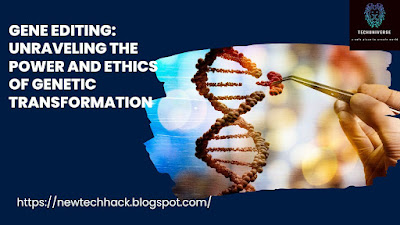In the ever-evolving landscape of scientific discovery, gene editing stands as a revolutionary force with the potential to reshape the very fabric of life. This remarkable technology, often associated with the CRISPR-Cas9 system, has ushered in a new era of possibilities, from curing genetic diseases to enhancing crops. However, it also raises profound ethical and societal questions. In this comprehensive article, we'll embark on a journey through the world of gene editing, exploring its mechanisms, applications, challenges, and the ethical considerations that come with wielding the power to modify life at the molecular level.
Understanding Gene Editing:
Gene editing refers to the deliberate modification of DNA within an organism's genome. The CRISPR-Cas9 system, inspired by the immune defense mechanism of bacteria, has become the cornerstone of gene editing. It allows scientists to precisely target and edit specific DNA sequences, offering unparalleled precision and efficiency.
Applications in Medicine:
- Treating Genetic Diseases: Gene editing holds the promise of correcting faulty genes responsible for inherited disorders like sickle cell anemia and cystic fibrosis.
- Cancer Therapy: Editing genes associated with cancer susceptibility may lead to innovative treatments and prevention strategies.
- Precision Medicine: Customized gene editing could tailor medical treatments to an individual's genetic makeup.
Ethical Considerations:
- Germline Editing: Editing genes in human embryos or germline cells raises questions about passing modified traits to future generations.
- Unintended Consequences: Genetic modifications may have unforeseen effects, potentially leading to unintended health or environmental impacts.
- Designer Babies: The potential to modify genes for enhanced traits sparks debates about ethical boundaries and the creation of "designer babies."
Applications Beyond Medicine:
- Agriculture: Gene editing can lead to crops with enhanced yields, nutritional value, and resistance to pests and diseases.
- Conservation: Gene editing might aid in preserving endangered species and restoring ecosystems.
- Biofuel Production: Modified organisms could contribute to more efficient and sustainable biofuel production.
- Regulation and Responsibility:
- Global Guidelines: The need for international consensus on gene editing regulations is paramount to ensure responsible and safe research.
- Open Dialogue: Ethical discussions involving scientists, policymakers, ethicists, and the public are crucial for shaping the future of gene editing.
The Future of Genetic Transformation:
Gene editing stands at the intersection of scientific advancement and ethical contemplation. As scientists harness the potential of this technology, humanity must tread carefully, ensuring that progress aligns with moral considerations. The road ahead requires collaboration, open discourse, and a commitment to using gene editing for the betterment of humanity and the preservation of our shared genetic heritage. In embracing the power to edit genes, we embark on a journey that demands not only scientific rigor but also profound ethical introspection.






No comments:
Post a Comment